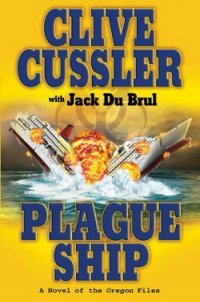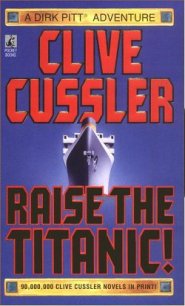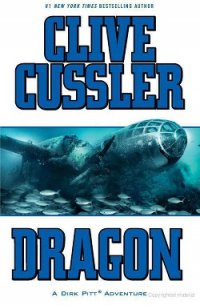Plague Ship - Cussler Clive (полные книги .TXT) 📗

Жалоба
Напишите нам, и мы в срочном порядке примем меры.
Plague Ship - Cussler Clive (полные книги .TXT) 📗 краткое содержание
Plague Ship читать онлайн бесплатно
DIRK PITT® ADVENTURES BY CLIVE CUSSLER
Treasure of Khan(with Dirk Cussler)
Black Wind(with Dirk Cussler)
Trojan Odyssey
Valhalla Rising
Atlantis Found
Flood Tide
Shock Wave
Inca Gold
Sahara
Dragon
Treasure
Cyclops
Deep Six
Pacific Vortex
Night Probe
Vixen 03
Raise the Titanic!
Iceberg
The Mediterranean Caper
KURT AUSTIN ADVENTURES BY CLIVE CUSSLER WITH PAUL KAMPRECOS
The Navigator
Polar Shift
Lost City
White Death
Fire Ice
Blue Gold
Serpent
OREGON FILES ADVENTURES BY CLIVE CUSSLER
WITHE JACK DU BRUL
Skeleton Coast
Dark Watch
WITH CRAIG DIRGO
Sacred Stone
Golden Buddha
OTHER FICTION BY CLIVE CUSSLER
The Chase
NONFICTION BY CLIVE CUSSLER AND CRAIG DIRGO
The Sea Hunters
The Sea Hunters II
Clive Cussler and Dirk Pitt Revealed
Clive Cussler and Dirk Pitt Revealed
PLAGUE SHIP
A NOVEL OF THE OREGON FILES
CLIVE CUSSLER WITH JACK DU BRUL
Plague went through Europe and killed a third of its population. Lands were consolidated, allowing for a greater standard of living, not only for the owners but also for those who worked them. This event was the single greatest contributor to the Renaissance and gave rise to Europe’s eventual domination of the world.
We’re Breeding Ourselves to Death:
How Overpopulation Will Destroy Civilization, by Dr. Lydell Cooper, Raptor Press, 1977
PROLOGUE
BARENTS SEA
NORTH OF NORWAY
APRIL 29, 1943
A PALE HUNTER’S MOON HUNG ABOVE THE HORIZON so that its light threw dazzling reflections off the frigid ocean. With winter not yet given way to spring, the sun had yet to rise this year.
Instead, it remained hidden behind the earth’s curvature, a faint glowing promise that crept along the line where sky met sea as the planet spun on its tilted axis. It would be another month before it would fully show itself, and, once it did, it would not disappear again until fall. Such was the odd cycle of day and night above the Arctic Circle.
By rights of their extreme northern latitudes, the waters of the Barents Sea should be frozen over and impassable for most of the year. But the sea was blessed with warm waters cycling up from the tropics on the Gulf Stream. It was this powerful current that made Scotland and the northern reaches of Norway habitable, and kept the Barents free of ice and navigable even in the deepest winters. For this reason, it was the primary route for war material being convoyed from the tireless factories of America to the embattled Soviet Union. And like so many such sea routes—the English Channel or the Gibraltar Strait—it had become a choke point and, thus, a killing ground for the wolfpacks of the Kriegsmarine and shore-based Schnellboots, the fast-attack torpedo boats.
Far from random, the placement of U-boats was planned out with the forethought of a chess master advancing his pieces. Every scrap of intelligence was gathered about the strength, speed, and destination of ships plying the North Atlantic in order to have submarines positioned to strike.
From bases in Norway and Denmark, patrol aircraft scoured the seas, looking for the convoys of merchantmen, radioing positions back to fleet headquarters so the U-boats could lie in wait for their prey.
For the first years of the war, the submarines enjoyed near-total supremacy of the seas, and untold millions of tons of shipping had been sunk without mercy. Even under heavy escort by cruisers and destroyers, the Allies could do little more than play the odds of having one ship sunk for every ninety-nine that made it through. By being gambled so coldly, the men of the merchant marine paid as high a toll as frontline combat units.
That was about to change this night.
The four-engined Focke-Wulf Fw 200 Kondor was a massive plane—seventy-seven feet long, with a wingspan of nearly one hundred and ten feet. Designed before the war for Lufthansa as a passenger airliner, the aircraft had been quickly pressed into military duty as both a transport and a long-range reconnaissance platform. Her twenty-five-hundred-mile range allowed the Kondor to remain aloft for hours and hunt Allied shipping far from shore.
Used in an attack roll through 1941 by carrying four five-hundred-pound bombs under her wings, the Kondor had taken some heavy losses and was now strictly employed as a reconnaissance plane, and remained well above Allied antiaircraft fire during their patrols.
The aircraft’s pilot, Franz Lichtermann, chafed at the monotonous hours spent searching the trackless sea. He longed to be in a fighter squadron, fighting the real war, not loitering thousands of feet above frigid nothingness hoping to spot Allied shipping for someone else to sink. Back at base, Lichtermann maintained a high level of military decorum and expected the same from his men. However, when they were on patrol and the minutes stretched with the elasticity of India rubber, he allowed a certain amount of familiarity among the five-man crew.
“That should help,” he commented over the intercom and jerked his head in the direction of the dazzling moon.
“Or its reflection will hide a convoy’s wake,” his copilot, Max Ebelhardt, replied in his customary pessimistic tone.
“With the sea this calm we’ll spot them even if they’ve stopped to ask for directions.”
“Do we even know if anyone’s out here?” The question came from the crew’s youngest member, Ernst Kessler. Kessler was the Kondor ’s rear gunner and sat scrunched at the aft of the ventral gondola that ran the partial length of the aircraft’s fuselage. From behind his Plexiglas shield and over the barrel of a single MG-15 machine gun, he could see nothing other than what the Kondor had already flown over.
“The squadron commander assured me that a U-boat returning from patrol spotted at least a hundred ships two days ago above the Faeroe Islands,” Lichtermann told his crew. “The ships were heading north, so they’ve got to be out here somewhere.”
“More likely, the U-boat commander just wanted to report something after missing with all his torpedoes,” Ebelhardt groused, and made a face after a sip of tepid ersatz coffee.
“I’d rather just spot them, then sink them,” Ernst Kessler said. The gentle lad was barely eighteen, and had harbored ambitions of being a doctor before he had been drafted. Because he came from a poor rural family in Bavaria, his chances of an advanced education were nil, but that didn’t prevent him from spending his off-hours with his nose buried in medical journals and texts.
“That isn’t the proper attitude of a German warrior,” Lichtermann admonished gently. He was thankful that they had never come under enemy attack. He doubted Kessler would have the stomach to open fire with his machine gun, but the boy was the only member of his crew who could sit facing aft for hour after hour without becoming incapacitated by nausea.
He thought grimly about all the men dying on the Eastern Front, and about how the tanks and planes shipped to the Russians prolonged the inevitable fall of Moscow. Lichtermann would be more than happy to sink a few ships himself.
Another tedious hour dragged by, the men peering into the night in hopes of spotting the convoy.
Ebelhardt tapped Lichtermann on the shoulder and pointed to his log. Although the fore gunner kneeling at the front of the ventral gondola was the official navigator, Ebelhardt actually calculated their flight time and direction, and he was indicating that it was time for them to turn and search another swath of open sea.




